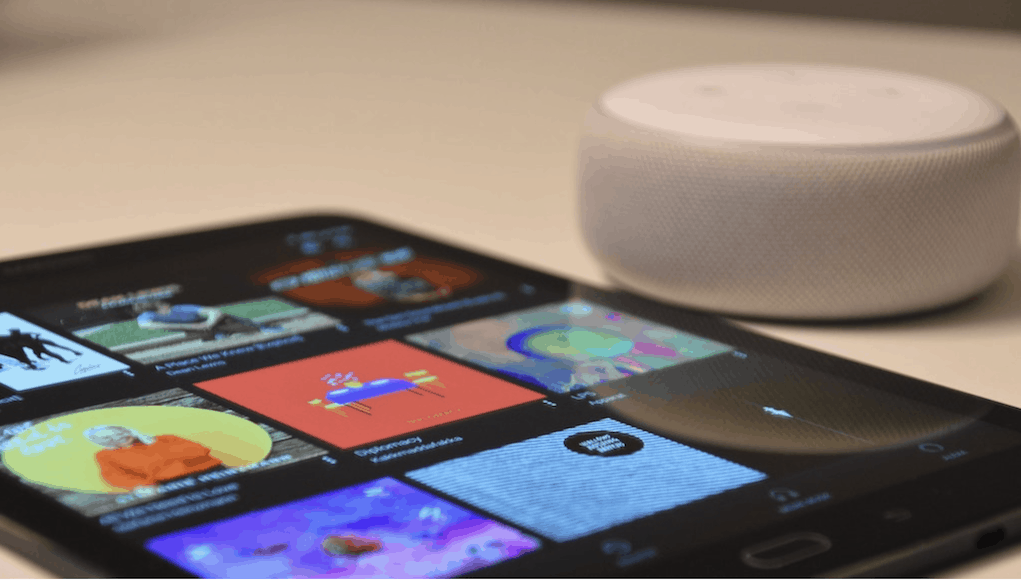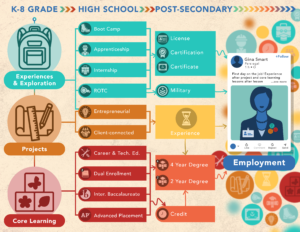Students Use AI Virtual Assistant to Prepare Peers for High School

In the Getting Smart #AskAboutAI report, Artificial Intelligence will have implications for employment, ethics and education serving as perhaps the prime example of a major industry that is ripe for platform disruption. Therefore, how can schools make students producers of AI rather than consumers to help prepare for the #FutureOfWork?
AI Virtual Assistant
According to educator Rachelle Poth, it is about finding the right resources for all students, using AI virtual assistants such as Alexa, Bixby, Google and Siri.
More often than not, most people think about AI Virtual Assistant devices as a tool to get very general information, such as “Hey Google, tell me the weather today, or Alexa, what was the score of the game last night?”
But what if students could actually program AI Virtual Assistant devices to help answer questions that are relevant to their lives? That is exactly what students at David. E. Williams did at Montour School District, in collaboration with Witlingo. Witlingo is focused on building products and solutions that make it easier for companies, organizations of all sizes to deliver Voice First experiences such as Alexa skills and Google Home actions quickly, with minimal effort and at minimal cost.
Now, anyone, in any part of the world, can now ask Google Home or Amazon Alexa questions about Montour High School delivering voice first experiences from real students. Go ahead, give it a try:
“Hey Google, talk to Montour High School,” or “Alexa, Launch Montour High School.”
How Did Students Do It?
After conducting interviews with students, collecting their answers, analyzing the data and composing a list of top asked questions from peers, middle school students worked as a team to build the AI system. Using Witlingo’s Buildlingo tool, the students recorded the answers to the frequently asked questions that rising 8th graders may have about starting high school. Students tagged questions and answers, tested the skill and action, adjusted the tagging for accuracy and tested some more, all along in the process of teaching the AI how to better answer questions and the many variations that students may ask.
Tools like Buildlingo also pioneer a way for anyone in a range of specializations, like research and content creation, to contribute to the central AI project without having to invest the majority of their time in coding. Using Buildlingo, the students will also be able to iterate upon any new questions that the voice assistants were not originally equipped to answer.
What’s Next?
Using analytics and the system dashboard, students will review and monitor frequently asked questions to meet the needs of their peers. The dashboard will reflect keywords and phrases that the system is asked by the general public and report which answer was assigned and played in response to the question. Once a new question is received that requires a new answer, the system will reflect so the students can continue to expand the database of answers.
Finally, this AI technology is no stranger to the Montour School District. Montour launched the first AI program in the country in the fall of 2018 introducing middle school students to AI Ethics, AI Autonomous Robotics, AI Music and AI Computer Science. In addition, Montour piloted AI4All’s Open Learning platform at the high school level and used Experiments with Google to introduce AI concepts in grades kindergarten through fourth grade.
For more, see:
- #AskAboutAI: Learning to See and Speak
- The Future of Work: How Do We Prepare Our Students?
- Assistive Technology: Finding the Right Resources for All Students
Stay in-the-know with innovations in learning by signing up for the weekly Smart Update.








Virtual Assistant Philippines
I was looking for something similar to this. Thank you a lot!
Virtual Assistant Philippines
I love this blog. I dont know what I'd do without you and your great info! Thank you so much.